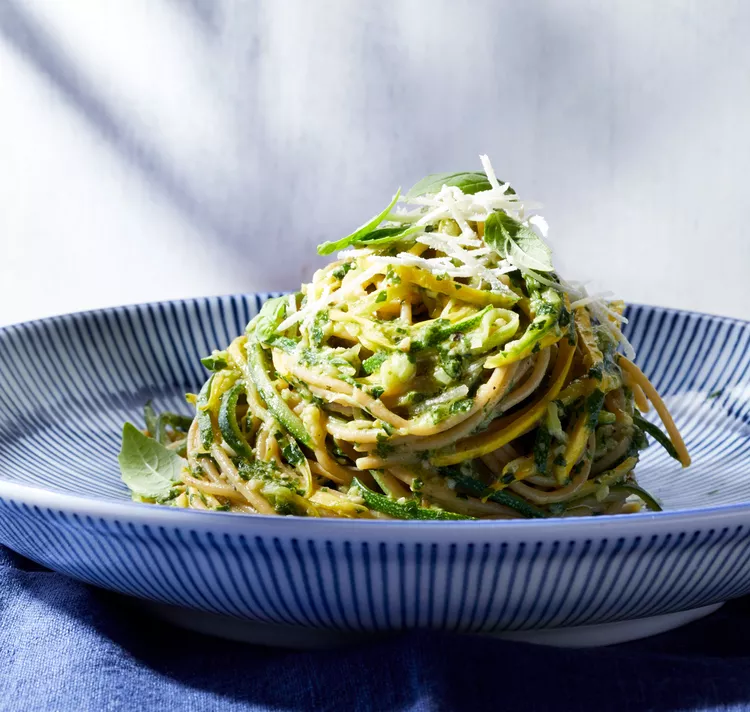Spaghetti and Zucchini Noodles with Basil-Walnut Pesto

Ingredients
-
4 medium zucchini or summer squash (2 1/4 to 2 1/2 lb. total)*
-
1 teaspoon salt
-
8 ounce dried whole-wheat spaghetti
-
2 cup packed fresh basil leaves, coarsely chopped, plus more for garnish
-
½ cup walnut pieces, toasted
-
6 tablespoon olive oil
-
¼ cup freshly grated Parmesan cheese
-
3 tablespoon lemon juice
-
2 cloves garlic, halved
-
½ teaspoon black pepper
Directions
-
Using a spiral vegetable slicer or peeler, cut zucchini lengthwise into long, thin strands (stop when you reach the seeds). Place the strands in a colander and toss with 1/4 tsp. of the salt. Let drain at least 15 minutes, then gently squeeze zucchini to remove any excess moisture. Pile the strands on a cutting board and chop them once or twice to break them up.
-
Meanwhile, cook spaghetti according to package directions. Reserve 1/2 cup of the cooking water; drain pasta.
-
In a small food processor combine basil, walnuts, 5 Tbsp. of the oil, the Parmesan, lemon juice, garlic, pepper, and the remaining 3/4 tsp. salt Process until smooth. Transfer pesto to a large bowl.
-
In a 10-inch skillet heat the remaining 1 Tbsp. oil over medium-high. Add zucchini; cook and stir about 3 minutes or until heated and slightly tender. Transfer to bowl with the pesto. Add spaghetti; toss to combine. If the mixture seems dry, add the reserved pasta cooking water a little at a time. If you like, garnish with additional basil.
*Tip
If you like, skip Step 1 and use 2 lb. refrigerated zucchini noodles.
Nutrition Facts (per serving)
| 369 | Calories |
| 23g | Fat |
| 36g | Carbs |
| 11g | Protein |
| Nutrition Facts | |
|---|---|
| Servings Per Recipe 6 | |
| Calories 369 | |
| % Daily Value * | |
| Total Fat 23g | 29% |
| Saturated Fat 3g | 15% |
| Cholesterol 2mg | 1% |
| Sodium 461mg | 20% |
| Total Carbohydrate 36g | 13% |
| Total Sugars 5g | |
| Protein 11g | 22% |
| Potassium 665mg | 14% |
*The % Daily Value (DV) tells you how much a nutrient in a food serving contributes to a daily diet. 2,000 calories a day is used for general nutrition advice.